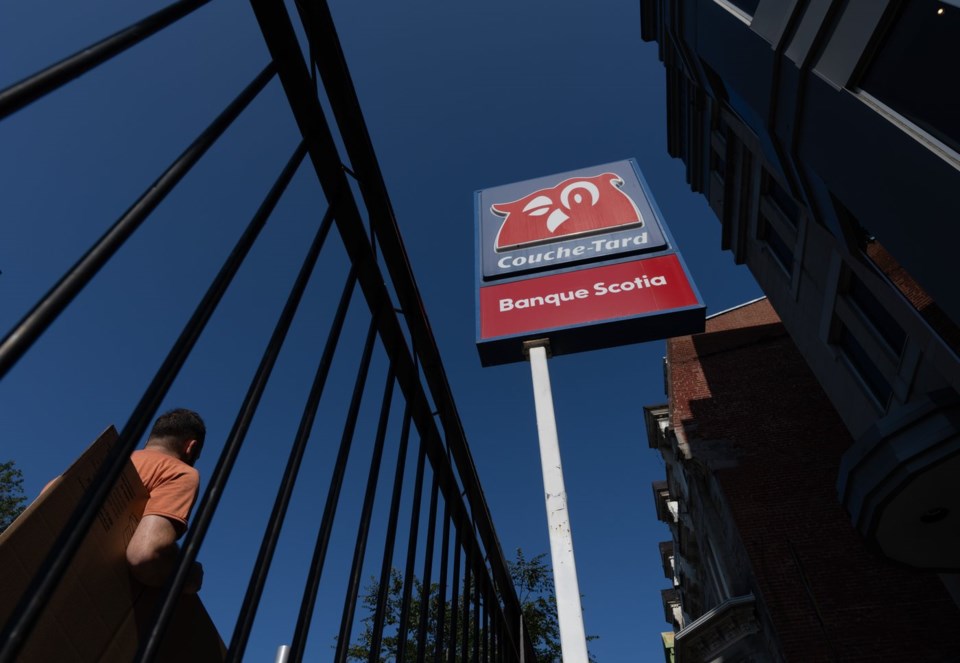Alimentation Couche-Tard Inc.'s chief executive says the company is taking a "persistent" but "friendly" approach with the Japanese owner of the 7-Eleven convenience store chain it's trying to acquire.
Alex Miller said Tuesday that he remains confident in that approach and the Laval, Que.-based firm's ability to finance and close on the non-binding bid for Seven & i Holding Co. Ltd.
"We continue to see a strong opportunity to grow together and enhance our offerings and service to millions of customers across the globe," Miller told analysts on a call meant to discuss the company's second-quarter earnings.
Since Couche-Tard made its bid for Seven & i in mid-August, it has faced an uphill battle to close the deal.
First, Seven & i criticized the offer as too low to seriously consider, pushing Couche-Tard to increase its bid.
Then, Junro Ito, a member of the family that helped found Seven & i and the company's vice-president and director, made a rival buyout proposal earlier this month.
Media reports have suggested the founding family will finalize funding for the buyout at the end of December and take Seven & i private by the end of February 2025, Desjardins analyst Chris Li said.
"We believe the proposed buyout by the founding family further lessens the likelihood of Alimentation Couche-Tard winning the deal, as we expect Alimentation Couche-Tard to exercise financial discipline," he wrote in a note to investors Tuesday.
Miller, however, said he still sees Couche-Tard's bid as "the most compelling outcome for all shareholders, employees and key constituent constituencies of both companies."
A successful bid would marry Seven & i's empire of 7-Eleven convenience stores, supermarkets, food producers, household goods retailers and financial services companies with Couche-Tard's own sprawling network.
Couche-Tard, which employs 149,000 people, has more than 16,800 stores in 31 countries. About 13,000 of those locations sell fuel.
Miller's remarks came a day after Couche-Tard revealed its second-quarter earnings attributable to shareholders were US$708.8 million, down 13.5 per cent from US$819.2 million a year earlier.
Earnings per diluted share for the period ended Oct. 13 were 75 cents US, down from 85 cents US during the same quarter last year.
The company, which keeps its books in U.S. dollars, said its adjusted net earnings were reduced primarily due to a lower road transportation fuel gross margin in the U.S. as well as softer consumer traffic and demand and other factors.
Same-store fuel volumes in the U.S. alone were down 2.2 per cent, which the company largely blamed on Hurricane Helene and Hurricane Milton, which hit the country in September and October, respectively.
Miller said the storms impacted four of Couche-Tard's business units within two weeks of each other.
"The hurricane shut down hundreds of our stores, mainly due to power loss, but thanks to the extraordinary efforts of our operations, fuel facilities and logistics teams, we were able to open all but a handful of them within a few days," he said.
The quarter also brought some good news. Couche-Tard's revenues amounted to US$17.4 billion, up six per cent from US$16.4 billion.
The company also took advantage of a change in legislation that allowed convenience stores and other retailers in Ontario to start offering a selection of beer, cider, wine and ready-to-drink alcoholic beverages
"We now command impressive market leadership in beer sales in Ontario," Miller said.
Irene Nattel, an analyst with RBC Capital Markets, concluded it was a "solid but uninspiring quarter", while Martin Landry of Stifel said the results reflected "soft consumer spending and high promotional activity."
Consumers have been more cautious about spending for most of the year because inflation and high interest rates. Both have been easing in recent months, but shoppers have been slow to reverse their spending habits.
"What we hope is that ... inflation goes down and folks can start to feel better about their disposable incomes," Miller said.
He was also asked about incoming U.S. president Donald Trump, who threatened late Monday to impose a 25 per cent tariff on all Canadian goods coming into his country. The tariff will last until Canada and Mexico stop drugs, especially fentanyl, and people from illegally crossing the borders, Trump said.
"It's awfully early days and there's a lot of speculation," Miller said.
Despite the uncertainty, Couche-Tard has started looking at some scenarios based on what the Trump administration may do.
The calculations showed the company's earnings before tax make up about 0.6 per cent of its U.S. sales. Miller estimates half of those figures could be "at risk" by Trump's potential moves and "everyone would be impacted similarly."
"We have started to consider some things, but we don't see anything at this time that we think is going to overly impact to us," he said.
This report by The Canadian Press was first published Nov. 26, 2024.
Companies in this story: (TSX:ATD)
Tara Deschamps, The Canadian Press
